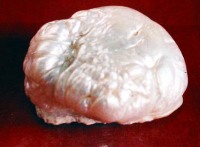World's largest available natural pearl to be auctioned
The world's largest available natural pearl is set to be auctioned in this Emirates' capital.

The 575 carat pearl from 12th century Mongolia was formerly owned by Chinese emperors, Persian kings, the grandson of Genghis Khan and Marco Polo. It will be up for bidding in Abu Dhabi's Emirates Palace and on the Internet, where it is estimated to raise up to US$8 million (EUR5.89 million).
The value of the 3.1 inch (7.87 centimeters) saltwater pearl known as the "Arco Valley pearl" is based on its size, color, weight, exclusivity, history and previous records of what people have been prepared to pay for similar precious items.
"It's 800 years old and it still takes your breath away," said Khaled al-Sayegh, 35, a jeweler from Abu Dhabi and chairman of the organizing committee for Thursday's event.
Arco Valley is the biggest pearl for sale in the world, but not the largest in size. The 9.45 inch (24 centimeter) Pearl of Allah carries that title. It was found by a diver off the Philippine island of Palawan in 1934 but is not up for sale and is stored in a museum in the Philippines.
The Arco Valley pearl, named after a previous owner from Austria's Arco Valley family dynasty, is white with a touch of blue and mixed with pink and cream colors on its sides. It has been drilled three times: to fit among the jewels of an unknown lady's tiara, to go with a ceremonial mandarin suit and to fit a crown or turban decorated with precious stones belonging to a Persian king.
Though it has since been restored to its original shape, the pearl remains shrouded in mystery.
The pearl's whereabouts and ownership have puzzled experts and collectors for centuries. However, documents in the Arco Valley court prove the pearl was owned by Kublai Khan, the 13th century emperor of China and grandson of Genghis Khan. Experts believe Kublai Khan gave the pearl to Marco Polo as a gift.
Al-Sayegh said he and his partner brought the Arco Valley pearl to Abu Dhabi less than two months ago. He said the pearl was privately owned but did not disclose its latest owner's name and location.
Al-Sayegh said he wants Abu Dhabi to become a pearl trading hub. Pearls are already featured in the Dubai Stock Exchange alongside gold and silver.
"I want Abu Dhabi to become again what it used to be the capital of pearls," al-Sayegh said. He plans to rehabilitate the trade in natural pearls, which until the 1960s was mastered by a woman, Sheika Hassa bint Al Moor, the mother of Dubai's ruler until 1990, the late Sheik Rashid bin Saeed Al Maktoum.
Al-Sayegh is convinced there are still pearls in the Gulf but not as many as a century ago, when they were the biggest income providers for Arab inhabitants of the Persian Gulf before the discovery of oil in the 1930s.
The quest for black gold on land and later in the sea made diving excursions around the Gulf, where the first pearls were found 7,000 years ago off the shore of today's Kuwait, too time consuming and labor intensive compared with quick earnings from the emerging oil industry. Pollution and the invention of cultivated pearls also contributed to the death of the pearl industry in the Gulf.
But for al-Sayegh, Thursday's auction is not only about cleaning up the waters, reviving a lost tradition and spreading awareness of the pearl's heritage among the post oil generation it's also business.
"And what will make you more money than jewelry?" al-Sayegh said.
At least 400 people from around the Emirates and the Gulf countries as well as from China, India, the U.K., the U.S. and Tahiti are expected to attend the auction.
Subscribe to Pravda.Ru Telegram channel, Facebook, RSS!


